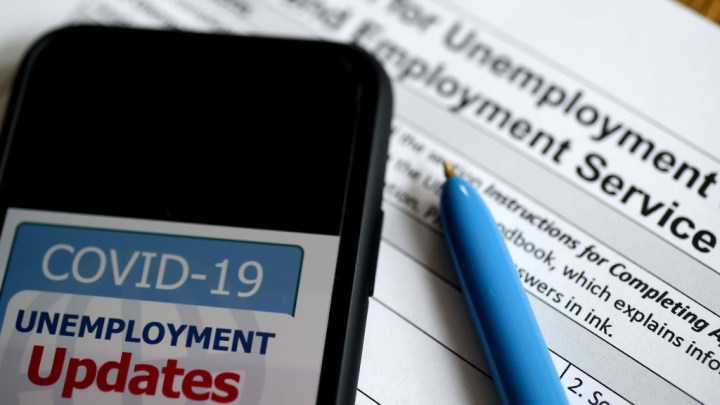
Why some gig workers are getting less in unemployment benefits
Why some gig workers are getting less in unemployment benefits

State claims systems have been overwhelmed with unemployment insurance applications, causing delays. But even for those who have managed to apply, a new problem has emerged: Some are getting less money than others, simply because of how their work is classified.
Marketplace’s Nova Safo has been looking into this, and he points out that Congress has tried to shored up the unemployment system by making gig workers eligible for benefits through the Pandemic Unemployment Assistance program.
“Before that, you needed a traditional job with an employer and a W-2 to get unemployment insurance benefits,” Safo told “Marketplace Morning Report” host David Brancaccio.
The problem is, a lot of gig workers also have some W-2 income, maybe from a part-time or temporary job, in addition to their self-employment. If that’s the case, those workers are ending up in the “traditional” unemployment system, with only their W-2 earnings — which are limited — used to determine their unemployment insurance benefit amount. Their self-employment income is not used at all in that calculation.
Jennifer Cogan, a San Francisco-based tango instructor, says this has affected her.
“So if I was eligible clearly for PUA, I would qualify for $386 a week,” she said. “If I am forced onto regular UI, I qualify for $87 a week.”
That’s quite the difference. Cogan also works as an outdoor backpacking and cycling guide, work that has all but stopped since the outbreak started. She had actually just gotten a promotion in that job, work that was slated to start on March 16. San Francisco’s shelter-in-place order started March 17.
So she was only on the job for one day, but her employer paid her through the end of month amid the lockdown. That was the pay classified under W-2 earnings. It’s what’s prevented her from getting the rest of her insurance benefits.
“I haven’t done the math on that, but it’s like thousands and thousands of dollars,” Cogan said.
Cogan is currently working on an appeal. She says she’s “one of the lucky people” because her husband is still working. But she’s hoping the government can find a fix for situations like hers.
“I think it’s important that Congress recognizes that people don’t fit into two clear categories anymore, like they did perhaps in the past — either you’re a worker for another company or you’re a self-employed individual. There absolutely are people who make money from a variety of those two incomes, aka this hybrid worker,” Cogan said. “And that’s super important that they recognize that and adjust law accordingly to compensate those individuals.”
There are rumblings in Washington, conversations in Congress and among experts, over efforts to solve this issue with a legislative fix.
“The right approach would be for Congress to step in and say, ‘Look, states should look at a worker’s income regardless of the source,'” said Indi Dutta-Gupta, co-executive director of the Georgetown Law Center on Poverty & Inequality.
That would make them eligible for the maximum benefit amount.
There’s a lot happening in the world. Through it all, Marketplace is here for you.
You rely on Marketplace to break down the world’s events and tell you how it affects you in a fact-based, approachable way. We rely on your financial support to keep making that possible.
Your donation today powers the independent journalism that you rely on. For just $5/month, you can help sustain Marketplace so we can keep reporting on the things that matter to you.


















